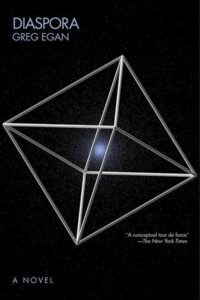Welcome to my monthly book recommendation for April! On the first day of each month, I’ll recommend a book, new or old, fiction or nonfiction, pulled from my own reading experience. In my recommendation, I’ll introduce the book, discuss why I found reading it worthwhile, and what major themes the book touches upon. I won’t include any major spoilers, but I may discuss some of the characters and specific details or locations from within the book. My recommendation for April, 2024 is Diaspora by Greg Egan.
Diaspora - Greg Egan
Available on Amazon
Author: Greg Egan
Genres: Science Fiction, Speculative Fiction
Description:
Since the Introdus in the twenty-first century, humanity has reconfigured itself drastically. Most chose immortality, joining the polises to become conscious software. Others opted for gleisners: disposable, renewable robotic bodies that remain in contact with the physical world of force and friction. Many of these have left the solar system forever in fusion-drive starships.
And there are the holdouts: the fleshers left behind in the muck and jungle of Earth—some devolved into dream apes, others cavorting in the seas or the air—while the statics and bridgers try to shape out a roughly human destiny.
But the complacency of the citizens is shattered when an unforeseen disaster ravages the fleshers and reveals the possibility that the polises themselves might be at risk from bizarre astrophysical processes that seem to violate fundamental laws of nature. The orphan Yatima, a digital being grown from a mind seed, joins a group of citizens and flesher refugees in a search for the knowledge that will guarantee their safety—a search that puts them on the trail of the ancient and elusive Transmuters, who have the power to reshape subatomic particles, and to cross into the macrocosmos, where the universe we know is nothing but a speck in the higher-dimensional vacuum.
My Thoughts on This Book
The first chapter serves as a wonderful introduction to the book. It melds the normally disparate concepts of life and the artificial by introducing a prominent character in a coming-to-life story. In all of my years of reading science fiction, I’ve never seen an author describe a process so algorithmic as the birth of a general artificial intelligence in such a lifelike, natural, and even playful manner. From the start, I knew reading this book would give me a truly unique experience.
The book starts roughly one thousand years in the future, a posthuman future. Humanity has branched off into three different paths. Our newborn protagonist, described above, belongs to the Citizens, disembodied human intelligences running as computer software that think and live hundreds of times faster than baseline humans. The Citizen population constitutes a large majority of the humans in this future. We also have the Gleisner Robots, similar to the Citizens in that they are software-based intelligences, but different in that they inhabit artificial, physical bodies, and choose to experience life at baseline speeds. The remaining population are the Fleshers, people who remain as naturally evolved humans, or as genetically engineered offshoots.
The first few chapters of the book speculate about the similarities and differences between these philosophies, such as the potential solipsism that arises when software-based intelligences retreat into their own virtual realities, or the futility of remaining as a static, primitive version of what humanity was before it learned how to guide its own evolution, how we can bridge these disparate philosophies together, or even the classic sci-fi conundrum of whether or not transferring your consciousness to another body constitutes death and birth instead of transference. This book handles this speculation delicately through its characters, how they talk to each other and through the actions they take, allowing the reader to organically absorb insights as brought about by those characters.
After a catastrophic event of cosmological scale occurs on Earth, humanity at large is shaken. The Citizens work to learn more about the causes of this event and how they can survive such an event in the future, an event they deem highly probable and of a higher scale of destruction. To that end, they create cloned copies of themselves on newly constructed vessels and send them throughout space. These diasporas make startling discoveries, such as a biological, naturally evolved lifeform analogous to the Citizens, and a planet whose entire chemical structure has been altered, down to the last atom.
In their quest to survive, understand the universe, and to follow in the footsteps of those before them, the diasporas eventually reach out into neighboring universes, exploring exotic five dimensional spaces, learning more about other alien civilizations, and ever reaching further and further into the future.
This book has a lot on its mind, densely packed, and I believe it handles this gracefully and articulately. However, it is very liberal in its use of scientific concepts and technical jargon, fictional or otherwise, and the reader may feel that they have trouble following along. This has the downside of potentially pushing readers away, but if they can stick through it, they will immensely benefit from the atmosphere and storytelling this science ‘mumbo-jumbo’ helps bring about. If you decide to read this book and have difficulty with this, particularly in the early chapters, I urge you to read-on. The inclusion of this language helps paint the picture that, as the plot progresses, the Citizens are venturing farther and farther away from their origins, leaving them behind for a promising but fearful future-unknown. These feelings of yearning, longing, beauty, and loneliness pervade the second half of the book, building up to a startling conclusion, which leaves the reader in a state of perplexity and awe.
